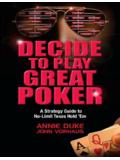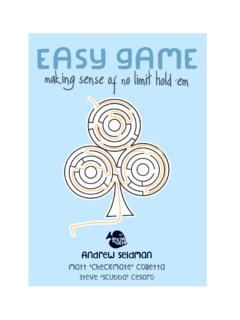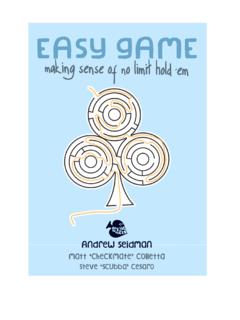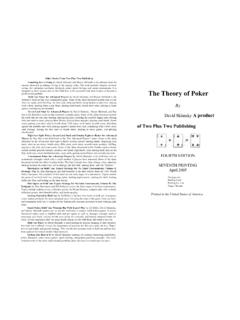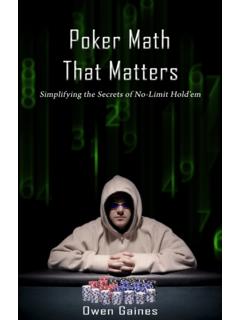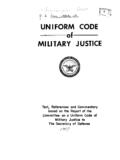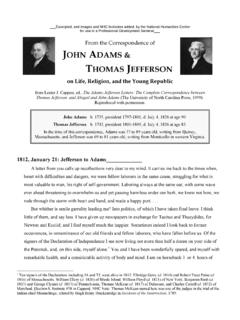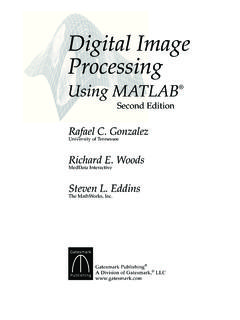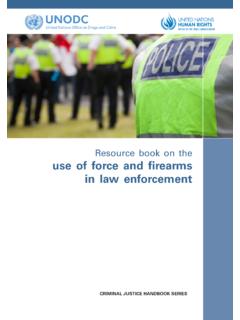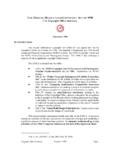Transcription of HERBERT O. YARDLEY Education - gamblingsystem.biz
1 HERBERT O. YARDLEY The Education of a Poker player Including where and how one learns to win Introduced by A. Alvarez The Education of a Poker player HERBERT Osborne YARDLEY was born in the small frontier town of Worthington, Indiana, in 1889. Following the death of his mother in 1905 he inherited $200 and, by his own admission, 'thereafter I did pretty much as I pleased'. He began frequenting a poker saloon in Washington even though he was still in high school. Class president, editor of the school paper and football captain, he was nevertheless academically average but had a flair for mathematics. He had ambitions to become a criminal lawyer but the year 1912 found him working instead as a code clerk in the State Department, a job which made full use of his mathematical skills and shrewd poker- player 's mind. In 1917 America entered World War I and YARDLEY persuaded his bosses to let him set up a code-breaking section with a staff of 160.
2 Officially this was called the Cipher Bureau, Military Intelligence 8; more familiarly it became known as the 'Black Chamber'. Some 200,000 messages were decoded, with YARDLEY himself breaking the Japanese diplomatic codes and finding himself a marked man in the Orient as a result, before the department was closed down in 1929 on the instructions of Secretary of State Henry Stimson, who remarked that 'Gentlemen do not read each other's mail'. Out of a job, YARDLEY set to work on The American Black Chamber, a no-holds-barred history of the organization's activities which scandalized the political and diplomatic world but became an international best-seller when published in 1931. A later book by YARDLEY , Japanese Diplomatic Secrets, was banned by Act of Congress in 1933, by which time its author was hard at work developing secret inks. His venture, however, proved a commercial failure, and between 1933 and 1935 he turned his hand to novel writing with The Red Sun of Nippon and The Blonde Countess.
3 The latter was filmed by MGM as Rendezvous, starring William Powell, Rosalind Russell and Cesar Romero, with YARDLEY as technical adviser; the New York Times called it a 'lively and amusing melodrama'. In 1938 he was hired by Chiang Kai-shek to monitor the coded messages of the Japanese armies invading China; he worked in Chungking under an alias with the cover of being an exporter of hides. In 1941, with Japan now at war with the United States, he was recalled and went back to working for the US Government, but not at code-breaking. Having had no career to speak of for the last thirty years of his life, by 1957, when The Education of a Poker player was first published, he could often be found playing cards with gullible journalists in the National Press Club in Washington. Though the 'Black Chamber' scandal had earned him some official distrust at home as well as abroad, he was nevertheless buried with full military honours in Arlington National Cemetery on his death in 1958.
4 According to one commentator, 'he was basically an attractive personality who enjoyed simple masculine pleasures. He would rise at dawn to go duck-hunting, shot a good enough game of golf to have won the Greene County (Indiana) championship in 1932, and played poker with a compulsive intensity wherever and whenever he could. He regaled his companions with a flood of amusing stories, told with the wit and gusto of a natural raconteur. He was the very opposite of stuffy, and did not hesitate to admit that he knew his way around a Chinese whorehouse. He kept a Chinese and a German mistress and once organized a virtual Oriental orgy for a young correspondent, later nationally famous, on the ground that it was necessary for him to be blooded as a man.' 1990 Oldcastle Books Ltd 18 Coleswood Road Harpenden, Herts AL5 1EQ Copyright HERBERT O. YARDLEY 1957 Introduction copyright Al Alvarez 1979 First published GB 1959 All rights reserved.
5 No part of this book may be reproduced, stored in a retrieval system, or transmitted in any form or by any means, electronic, mechanical, photocopying, recording, or otherwise, (except the Internet) without the written permission of the publishers. British Library Cataloguing in Publication Data record available ISBN 0 948353 76 7 9 8 7 6 5 4 3 2 1 Printed by The Guernsey Press Co. Ltd., Guernsey, Channel Islands. Contents Introduction by A. Alvarez Preface Part One: Three Poker Stories 1. Five-Card Draw, Jacks or Better 2. Five-Card Stud 3. Five-Card Draw, Deuces Wild with the Joker Part Two: Three Poker Stories 1. Five-Card Draw, Low Ball 2. Seven-Card Stud 3. Seven-Card Stud (Hi-Lo) Part Three: Other Poker Games 1. Five-Card Stud with the Joker 2. Six-Card Stud 3. Six-Card Stud with the Joker 4. Seven-Card Stud with Variations 1. Betty Hutton 2. Doctor Pepper 3. Low 4. High hand with the Joker 5.
6 Low Hand with the Joker 6. Hi-Lo with the Joker 7. Baseball 8. Football 9. Low Spade - High Hand 10. Low Hole Card Wild 4. Five Card Draw with variations 1. Jacks or Better with the Joker 2. Queens or Better with or without the Joker 3. Queens or Better with or without the Joker 4. Aces or Better with or without the Joker 5. Anything Opens with or without the Joker also Any Pair Opens with or without the Joker 6. Low Ball with the Joker 7. Spit-in-the-Ocean Introduction When I first played poker I believed, as all beginners do, that it was a game of chance, rather like chemin defer, where you gambled money on the turn of a card. Perhaps that was why the game appealed to me: for the risk and the obscure sense of machismo that goes with risk-taking. To gamble more than 1 could decently afford, blindly, like a dare, seemed a rather dashing thing to do. It proved what was otherwise not altogether apparent: that I was one of the boys, that I didn't care.
7 But it was also a misapprehension that cost me a good deal, both in money and in self-esteem. I lost regularly and was lucky only in that the people I played with in those days were as innocent and inexperienced and self-deluding as I was. One summer, however, a young American appeared in our game. He was a pale, sweating youth, grossly overweight. His eyes were small and close-set, his pudgy face was freckled, his crew-cut carrotty. In comparison to our fast-talking, rather literary group he seemed hopelessly inept and dull. A hick, clearly, with no small talk at all and even less charm. But he cleaned us out effortlessly, twice running, until the man who had brought him was told to withdraw the invitation. He handled the cards like a professional, crisply and deftly, and at the time all of us suspected him of cheating. I realize now that he was simply playing the classical game as it should be played 'by the book', while the rest of us were gambling wildly, unable to believe that hands which had started well wouldn't necessarily finish that way, or that we did not have some secret, special claim to the money we had already so optimistically contributed to the pot.
8 Soon after that a friend lent me HERBERT O. YARDLEY 's The Education of a Poker player and I began to understand what the game is about. Not luck but calculation, memory, patience, skill in reckoning the odds and percentages and, above all, observation: the ability to recognize and interpret the small fidgets and quirks, the hesitations, the voice's faint changes in timbre which indicate tension or confidence. I read YARDLEY through twice; first incredulous that anyone could play the game so conservatively, then appalled by my own previous naivety and optimism. Then I went back to the game and tried to apply what I had learned. For two years after that I played 'by the book' - that is, by YARDLEY , whom I re-read solemnly, ritually, each week before the game. And for two years, with a couple of minor and very mild exceptions, I did not lose. It was, even in retrospect, a good time.
9 My bank manager smiled at me whenever we met and asked no questions -or rather, he stopped asking questions - and the reviews I wrote weekly began to seem more pointless than ever. They became merely a way of filling in the days before I sat down at the poker table at eight o'clock each Friday evening. Why bother at all, I began to wonder, if it is this easy to make a modest living? But mercifully, before I had time to follow that train of thought through to its end, the call came, as it sometimes did in those days, to an American university, and by the time I returned the group had scattered. The games I graduated to were altogether subtler and sterner. Everybody knew 'the book' and most had read YARDLEY . Although there were no more easy pickings, the pleasure of playing the game skilfully with other skilful players was finally sharper, even when I lost, than the simple, ego-boosting satisfaction of taking money off mugs.
10 And that, in the end, is what it is all about. Terence Reece, who played bridge for England, has said that in terms of skill there is nothing to choose between bridge and poker. Yet before the Gaming Act of 1960 it was illegal to play poker in any British card club because whichever weird bureaucracy controls these matters had officially classified it, along with bingo, craps and roulette, as a game of chance. I suppose the civil servants were confused, as they often are, not by the reality of the game, but by its appearance. Poker looks like gambling - and at a low level of skill is gambling -because it must be played for money. The chips are as much instruments of the game as the cards. The way you bet or check or raise tells the other players about the nature of the cards you purport to hold. To take a very simple example: five-card stud, pot limit. After the last (fourth) open card has been dealt three players are left.
